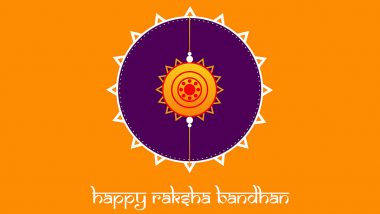Raksha Bandhan, also known as Rakhi, a traditional Hindu festival, celebrates the bond between brothers and sisters. The festival, rich in history and cultural significance, epitomises the love, protection, and commitment inherent in sibling relationships. It is a day marked by rituals, family gatherings, and the reaffirmation of familial ties. Raksha Bandhan 2024 will be observed on August 19, the last day of Shravan month. The term 'Raksha Bandhan' translates to ‘the bond of protection.’ On this day, sisters tie a sacred thread called ‘rakhi’ around the wrists of their brothers, praying for their long lives and prosperity. In return, brothers vow to protect their sisters from all harm and troubles. In this article, we will learn about Raksha Bandhan 2024 date, history, significance and celebrations.
Raksha Bandhan 2024 Date and Auspicious Timings
Rakhi or Raksha Bandhan 2024 will be celebrated on August 19, the last day of the lunar calendar month of Shravan. The tithi of tying rakhi ceremony begins from 01:30 PM to 09:08 PM. The ritual of Raksha Bandhan encapsulates the essence of the festival—the protection and care siblings extend to each other.
Raksha Bandhan History
The origins of Raksha Bandhan can be traced back to ancient times, with numerous historical and mythological accounts highlighting its significance.
Queen Karnavati and Emperor Humayun
According to one popular legend, the festival originated from the tale of Queen Karnavati of Mewar and Emperor Humayun. Facing a threat from Bahadur Shah, Queen Karnavati sent a rakhi, a sacred thread, to Humayun, requesting his protection. Moved by her gesture, Humayun came to her aid, thus symbolising the protective nature of the bond celebrated on Raksha Bandhan.
Draupadi and Krishna
One of the earliest references to the festival is found in the epic Mahabharata. According to the legend, Draupadi, the wife of the Pandavas, tied a strip of her sari around Lord Krishna’s wrist to stop the bleeding from a battlefield wound. Moved by her gesture, Krishna promised to protect her, which he did on several occasions. This act of tying a protective thread is the essence of Raksha Bandhan.
Rabindranath Tagore’s Initiative
During the Partition of Bengal in the early 20th century, Rabindranath Tagore initiated Rakhi Mahotsav, a mass Raksha Bandhan festival, to foster a sense of unity and love between Hindus and Muslims of Bengal. He introduced this tradition in response to British efforts to create division between communities.
Raksha Bandhan Significance, Rituals and Celebration
The significance of Raksha Bandhan extends beyond the familial bond. It embodies the values of love, protection, and duty. The festival celebrates the deep-seated relationship between siblings, who often provide each other with emotional and moral support. Raksha Bandhan also highlights the broader theme of familial unity and the importance of maintaining strong, loving relationships within the family structure.
Celebrations on Raksha Bandhan typically involve a series of rituals. Sisters prepare a thali with a rakhi, sweets, and a diya. The ritual begins with the sister performing an aarti for her brother, applying a tilak on his forehead, and tying the rakhi around his wrist. Brothers, in turn, express their gratitude by giving gifts and making a vow to stand by their sisters through thick and thin. The day is often marked by festive meals and gatherings, where families come together to celebrate their bond and enjoy traditional dishes.
Raksha Bandhan is a festival that beautifully encapsulates the essence of sibling love and protection. The special day celebrates enduring familial bonds. As families across India come together to observe this festival, they reaffirm their commitment to supporting and cherishing one another, reinforcing the timeless values that Raksha Bandhan represents.
(The above story first appeared on LatestLY on Jul 22, 2024 06:09 PM IST. For more news and updates on politics, world, sports, entertainment and lifestyle, log on to our website latestly.com).













 Quickly
Quickly


